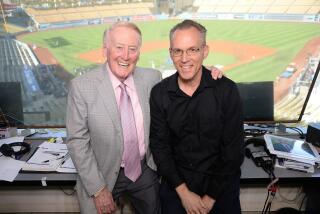Before giving listeners chills, Scully got them
- Share via
Vin Scully showed up unprepared for an assignment once in his life -- and Dodgers fans were the better for it.
It was 60 years ago this November, and Scully was a 21-year-old greenhorn, recently graduated from Fordham, new to the announcing business and eager to leave his mark.
The young New Yorker had been tapped by Red Barber to make his professional play-by-play debut at a Maryland-Boston University football game on Nov. 12, 1949, at Fenway Park.
Barber, voice of the Brooklyn Dodgers and host of a college football roundup show on the CBS Radio Network, had met Scully only briefly but remembered the redhead when he needed a substitute after another announcer took ill.
Scully, of course, looked forward to the assignment after working all summer in a studio in Washington, but his mind wasn’t entirely focused on football. Also that day, his alma mater would be playing at Boston College, with a postgame dance to follow.
So, even though it was mid-November in New England, Scully left his coat, hat and gloves in his hotel room, preferring to be unencumbered when he got to the dance.
“It was cold,” Scully says during a recent interview at Dodger Stadium, “but I thought -- naively, dumbly -- ‘I’m going to be working for a network; I’ll have a big booth.’ ”
Instead, he arrived at Fenway Park to discover that he would be calling the game from the roof, exposed to the elements.
“I’m looking for a booth, and there is no booth,” Scully says. “There’s an engineer with a card table and his little dials for volume, a microphone and about 50 yards of cable. That’s it.”
The temperature in Boston never climbed above 45 degrees that day, but Scully never mentioned his discomfort or his working conditions to his listeners. Cable trailing behind him, he walked back and forth along the roof following the action.
Meanwhile, the other three games being covered by the network were not nearly as competitive as the Maryland-BU game, so Barber frequently returned to Scully to carry the broadcast.
“The other games started falling by the wayside,” Scully says, “but my game was terrific. But it also gets dark, the wind is blowing off the Charles River, the lights are on and I’m freezing.”
By the time Maryland wrapped up a narrow victory, Scully says, he felt miserable. Dejectedly, he climbed down off the roof.
“I really feel like I’ve blown it,” he says. “So I go to the dance, meet some pals of mine, but I’m really down. And I’m down on the train going back to New York. I thought, ‘Here I was given this golden opportunity, but I was frozen, blah, blah, blah.’ ”
Two days later, though, a BU official phoned Barber to apologize for the shoddy treatment of a network announcer, explaining the circumstances of Scully’s broadcast and providing insight that Barber might never have learned otherwise.
“That turned out to be a big break,” Scully says, “because let’s say I did a very, very ordinary job. In Red’s mind, ‘This kid never mentioned anything about no booth, the cold, nothing.’ That made a very ordinary job a little more than that in Red’s mind.”
In his autobiography, “Rhubarb in the Catbird Seat,” Barber recalled, “Vin did a sound job, even though it was bitterly cold and he had to work with a hand mike on the exposed roof. The wind even blew his papers away, but he didn’t complain.”
Says Scully, “He called me -- I’ll never forget it -- and said something to the effect of, ‘Pretty tough day up there on the roof?’ And I said, ‘Yes, sir, it was cold.’ And he said, ‘You’ll have a booth this week: You’re doing Harvard-Yale.’ ”
Scully smiles.
He’d left his mark.
Two months later, after Ernie Harwell left the Dodgers’ broadcasting team to go to work for the New York Giants, Barber again remembered the redhead who hadn’t made a fuss.
Wrote Barber in his autobiography: “I always had the dream of taking an untutored kid who showed some promise and of putting him on the air for what he was, a neophyte learning the trade. Scully was a perfect choice. He was a green pea, but he was a very appealing young green pea. It was obvious he had something on the ball; you didn’t know precisely what it was, but he had it.”
Branch Rickey saw it too, telling Barber after meeting with Scully, “You have found the right young man.”
Scully joined the Dodgers in Vero Beach, Fla., in the spring of 1950 as their No. 3 announcer, sharing the booth with Barber and Connie Desmond. Only 3 1/2 years later, still only 25, he was calling the World Series on national television with Mel Allen.
By 1955, Barber was working for the New York Yankees, Desmond’s career had been derailed because of alcoholism and Scully was the Dodgers’ principal announcer.
It might never have happened, though, if Scully hadn’t left his coat, his hat and his gloves in his hotel room.
Maybe that was dumb.
Maybe it was naive.
But it worked out OK.
--
More to Read
Are you a true-blue fan?
Get our Dodgers Dugout newsletter for insights, news and much more.
You may occasionally receive promotional content from the Los Angeles Times.








